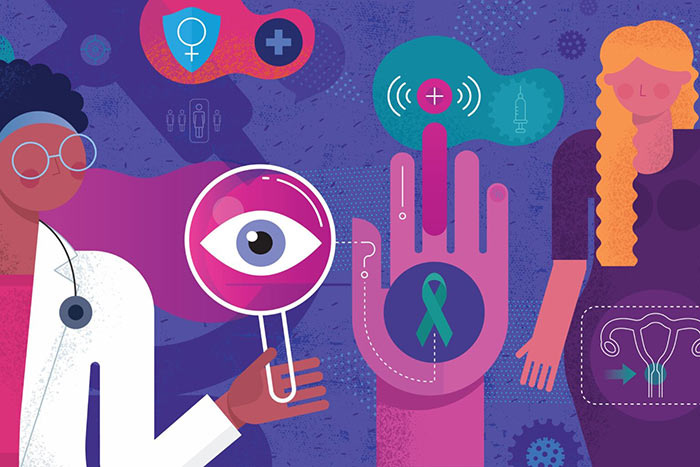“My boyfriend, now husband, made phone calls to find the best cervical cancer specialist in Atlanta,” recalls Amber. That’s how they met Dr. Modesitt, who has more than two decades of experience as a surgeon and oncologist for women with cancer. “She was very detailed, sensitive and didn’t sugarcoat things, which I appreciated.”
Amber had a PET/CT scan and MRI, which helped Dr. Modesitt see a more detailed view of the cancer. The cancer was likely still early and typed as Stage 1.
“Dr. Modesitt and her staff made themselves available to me anytime I needed them,” says Amber. “They would message me back any time of day for any question I had. Although this is standard practice for them every day, they knew it was my first time, and that’s how they treated me.”
Surgery Removed Amber’s Cervical Cancer
Patients with cervical cancer can receive a variety of treatments that include surgery, radiation and chemotherapy. Each Emory provider works with their patient to find the right treatment for their goals and condition. Because they caught Amber’s cancer early, Dr. Modesitt was confident surgery alone could cure it. Together, they chose a more intense surgical procedure because it gave Amber the best chance at becoming cancer-free and avoiding additional treatments, like radiation or chemotherapy.
In September 2022, Amber had a radical hysterectomy with sentinel lymph node biopsies (the sentinel lymph nodes are the first few lymph nodes cancer typically spreads to). A radical hysterectomy removes the uterus, cervix, tissue around the cervix and the upper vagina. Dr. Modesitt also took samples of the lymph nodes to see if the cancer had spread—and it had not.
Dr. Modesitt performed open surgery, a method proven to lead to better results for patients like Amber. Dr. Modesitt used a “bikini cut” incision, which made the scar less noticeable. For women who want to try to have children, surgeons can potentially perform other procedures that preserve fertility.
Amber’s recovery took over six months because she had a more intense surgery. For the first few months, Amber coped with post-operation pain. She had frequent check-ups with her doctor to monitor her recovery.
“All through my recovery, the nurses that cared for me were so sensitive and kind; it just floored me,” recalls Amber. “They knew me, and we talked about my kids. This was the best it could have been, and I am really grateful for it.”
Over a year later, Amber is cancer-free. Her surveillance exams with Dr. Modesitt have been normal, and a Pap test confirmed that there are no cancer cells. She’ll continue to get exams every few months and Pap tests yearly to monitor her health.
Care for Amber’s Emotional Health
In less than a month, Amber got a cancer diagnosis and had surgery to remove it. “The experience was terrifying, to say the least,” she says. “I chose not to tell anyone until the week before my surgery. I didn’t want to give them time to worry before I knew the stage and treatment plan.”
But Amber underestimated how much the experience would emotionally tax her. “I recommend people engage in therapy or group sessions. Find a support system from the beginning and throughout your recovery.”
The experience has prompted Amber to reprioritize her life. As part of a family business, she felt essential at her job. Now that the business has been sold, she can focus on herself. “My recovery opened my eyes to how stress impacts your body’s ability to heal. I can prioritize my physical and mental health over corporate success.”




